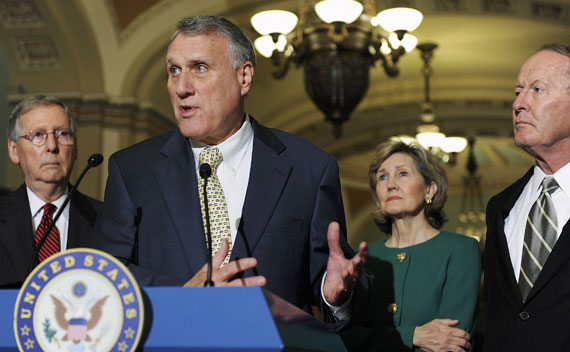Why Senate Republicans Won’t Blink First
More on:
I speculated yesterday on why the White House opted for a showdown on the New START Treaty when it lacks the 67 votes needed for victory. Here are ten reasons why the Republicans won’t blink first:
- Principle. Some Republican senators think that New START is a legitimately bad treaty that gives too much away to the Russians.
- Elections matter. If you believe that November 2 was a repudiation Obama’s agenda, why support one of his leading foreign policy priorities?
- President Obama will blink first. The president has drawn lines in the sand before on issues such as Israeli settlements and the public option in health care only to change his mind later. The best predictor of future performance is past performance.
- Opposing the treaty has no political downside. To quote Democratic strategist James Carville, “Most people don’t really give a pig’s patootie about a nuclear arms deal with Russia.” Voters don’t punish lawmakers for issues they don’t know or care about it. Voters who do care about New START aren’t going to pull the lever for Republicans anyway.
- Opposing the treaty has a political upside. The Republican base is spoiling for a fight, it doubts the wisdom of arms control, and it will likely remember the names of lawmakers who blinked at the first sign of pressure from the White House. A basic law of congressional life: When in doubt make sure you are on what your constituents regard as the “right” side of an issue.
- Skepticism about the supposed harmful geopolitical consequences of defeating New START. Treaty supporters are predicting all matters of harm if New START goes kaput. But administrations always say the sky will fall if their opponents succeed. Will U.S.-Russian relations really turn on the fate of what even many proponents agree is a modest treaty?
- Republican senators-elect want to be heard on New START. The people spoke on November 2. Why let an arbitrary deadline dictate the pace of a debate over a treaty that will become “the supreme law of the land”? Why not let the new voices that American elected at the polls have the opportunity to carry their message to Washington?
- The treaty fight can be used against the president politically. The economy is sputtering, unemployment is nearly in double digits, and the White House’s top priority is passing an arms control treaty?
- Skaggs’s Law applies—Or the squeaky wheel gets the grease. Antitreaty Republicans oppose the treaty with far more passion than protreaty Republicans support it. That means something. As former Representative David Skaggs (D-Colo.) noted about life on Capitol Hill, "When there are a few people who will die for the issue, and nobody else gets anywhere close to that, they can have their way."
- Political face—Or what political scientists call audience costs. The spat between the White House and Senate Republicans is now public. The news media and the blogosphere are itching to declare winners and losers. If President Obama gets his way, the political momentum shifts. The story line as 2011 dawns will be that the president has his mojo back. That’s not what Republicans had in mind on the morning of November 3.
Does this mean that President Obama can’t possibly win? No. But winning will require doling out a lot of goodies. Some Republican senators say they are open to being “persuaded.” These Republicans will be watching their fellow fence-sitters. After all, there is safety in numbers. So if Republican senators do blink during the lame-duck session, a lot of them will do so at once. That means a comfortable victory for the White House and the inevitable blog posts wondering why the “experts” failed to understand the power of the presidency to bring the Senate to heel.
(Photo: Jonathan Ernst/courtesy Reuters)
More on:
 Online Store
Online Store
